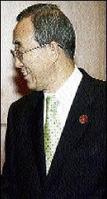
Ban-Ki-MoonPORT-AU-PRINCE, Haiti (AP):
United Nations (U.N.) Secretary-General Ban-Ki-moon arrived in Haiti yesterday to observe an 8,800-strong peacekeeping force that has helped bring relative calm to the troubled country for the first time since a 2004 revolt ousted the president.
Ban's 24-hour trip comes as the U.N. Security Council prepares to renew the Haiti mandate in October. Ban is expected to ask for more specialised forces such as naval units to help the Caribbean country guard its coastline from weapons and drug traffickers.
The peacekeepers came to the impoverished nation in 2004 after a revolt toppled former President Jean-Bertrand Aristide, sparking a long turf war against well-armed, slum-based gangs blamed for a wave of killings and kidnappings.
No public statements
The secretary-general was greeted upon arrival by President Rene Preval but made no public statements.
Ban's visit, his first since becoming leader of the world body, comes as the U.N. force begins a slow transition from a military to a policing role - a move officials say is essential to maintaining peace as the impoverished Caribbean country rebuilds.
Despite the improved security, the top U.N. envoy to Haiti says it's too soon to begin pulling out troops.
"An early withdrawal right now would be a big mistake, 'big' with a capital letter," Edmond Mulet recently told The Associated Press. "This is a time to hold on, to make this work this time."
He said gangs, drug trafficking and poverty still pose a threat to the country, and that peacekeepers would be needed at least until Preval's term ends in 2011.
Mulet, a Guatemalan who on Friday was appointed assistant secretary-general for peacekeeping operations, said the U.N. mission hopes to use more civilian police than soldiers but is hampered by a world shortage of trained, French-speaking officers.

